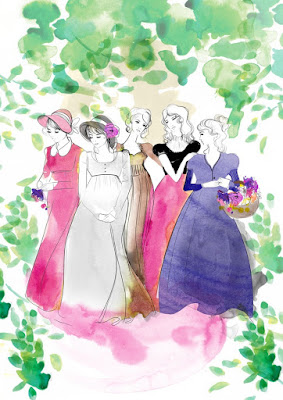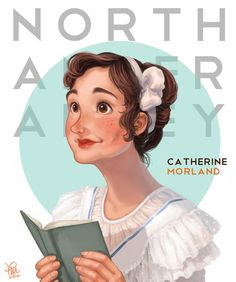Pride & Prejudice, ch. 5: Won't You Be My Neighbor?
 |
| The Bennet sisters all in a row. Credit to Mekel. |
I’m going to take a brief tangent here.
At 27, I was just starting a steady part-time job, mourning the abrupt cancellation of Happy Endings, and getting a slightly firmer grasp on how to pay off my student loans. I was halfway between regretting the extra time I took to study for my master’s and going back to school for a Ph. D. In other words, I was a mess, in a kind of ordinary way. But I was also finding ways to be more sure of myself at 27 than I did when I was, say, not one-and-twenty.
My point being, Charlotte Lucas has a lot of crap to deal with, which is not something I could appreciate until after a half-dozen re-reads. Her dad is hyper-obsessed with his title of “knight.” Her mom has no substantial personality traits. And, of course, being a 27-year-old single woman in 1813 had some baggage of its own, most of it financial, but I bet that also wasn’t great for the ol’ self-esteem. So when Charlotte lets Mrs. Bennet prattle on about the new rich guy having a crush on her eldest daughter, it’s more than cringe comedy: Charlotte is sitting on the sidelines and watching her future pass her by.
At least her BFF is Lizzy, right?
But she seems to be enjoying the view from that bench, even delivering a piece of gossip engineered to delight Mrs. Bennet even more. (Jane’s reaction to Bingley’s compliment is not noted in the text.) Then Charlotte teases Lizzy about Darcy’s snub and Mrs. Bennet gossips about Darcy’s rudeness and can I say, I give some credence to the report of “he seemed very angry at being spoken to”? Now, the “very angry” part sounds like an exaggeration that a couple of easily offended, gossipy people with nothing much else to do would come up with. But we know from chapter 3 that Darcy was not, in fact, happy to be there. So, to the ears of one who was trying to be engaging (even if it was for ulterior motives), Darcy’s reluctance to talk would probably sound ungrateful or grumpy.
Jane chimes in to give Darcy a fair shake, but it’s easy to dismiss because there’s such little substance to it. Of course Darcy would, in theory, be more talkative among his friends, Jane. As excuses go, that’s pretty weak. I wonder if Miss Bingley offered this tidbit about Darcy without prompting, like she was bragging about their inner circle.
Charlotte then posits that Darcy comes by his pride naturally, as he has “family, fortune, every thing in his favor.” This makes a lot of sense, especially if one infers that Darcy has had this pride instilled in him for his entire life. It’s also telling of how this society views pride and rank in general. Darcy possesses the things—money, land, his own home, a legacy—that give him his rank. He didn’t do anything to earn them, he just won the hereditary lottery. But his “right to be proud” is not questioned by any of the characters—though Lizzy points out that him wielding his pride in order to “mortify” her own makes it hard to sympathize with him.
Side-note: do we think Lizzy was actually embarrassed by Darcy’s snub? Granted, telling her friends how this antisocial moody guy talked smack about her and laughing about it with them would point to “no.” But she promises her mom that she’s never going to dance with him … which would suggest a little resentment on her part. That’s understandable, she’s not made of stone, I get it. I’m just suggesting that maybe by sarcastically playing the part of a spurned woman, she’s hiding her actual bruised feelings.
Or maybe I’m overthinking it. Hey, what else are blogs for?
Then middle sister (sigh) Mary jumps in to recite a textbook definition of pride. It’s not exactly to the point of the topic at hand, but I’ve always appreciated this diversion. “A person may be proud without being vain,” she intones. “Pride relates more to our own opinion of ourselves, vanity to what we would have others think of us.” It’s a real thinker, isn’t it? I mean, can a person be vain without having pride in herself? That’s a tricky-looking Venn diagram. Our unfortunate Mary unknowingly sets herself up as an example: she clearly wants others to think she’s well-read and intellectual. But is she proud of who she is, or just desperate for approval? Rarely do the two overlap.
Mrs. Bennet then gets into a childish argument … with a child. At least Mary can be secure in the knowledge that she wasn’t the one that drove the Lucases out of the house.
Soon to come: Lizzy champions Jingley some more, Charlotte lays out some stark relationship advice, and Darcy is in mental anguish.


I don't think Elizabeth was terribly upset about Darcy's remark. She surely didn't like it, and I am sure he heard about it at intervals for the rest of his life, but it was not really a big deal. The promise to her mother about not dancing with him was, I believe, a mild joke. "He doesn't think me handsome, he will probably not be in the neighborhood for long, we don't go to many balls and the chance of him also being there is slim, so I think I'm safe in promising you never to dance with him."
ReplyDeleteI agree about Elizabeth's promise - She says "I believe, ma'am, I may safely promise you never to dance with him". I read it as "Of course he will never ask me, so I am safe from dancing with him". The fact is, that at the next ball, when he asks her, she accepts despite her reluctance.
DeleteI think Lizzy resented Darcy's comment, more than being embarrassed by it.
ReplyDeleteBut more important to me in this chapter, I see the reaction to Mary as being too antipathetic. Mary comes across as a know-it-all, and I sympathize with that reaction, but I see a lot of criticism of Mary with little effort at trying to see her side. She's one of five sisters, all prettier than she in a time when beauty was all a poor woman had to offer (for she would have been poor without marriage after the death of her father). She's a bookworm, which is not characteristic of dumb people; and I'll have more to say about her treatment in the readership when the time comes (if you continue to indulge me, Anna :-)).